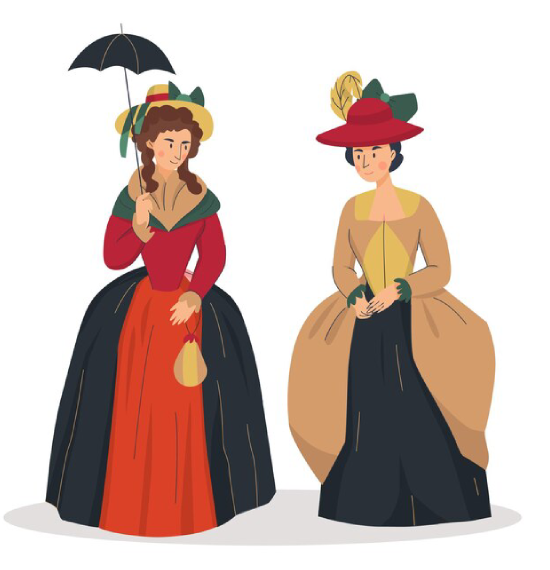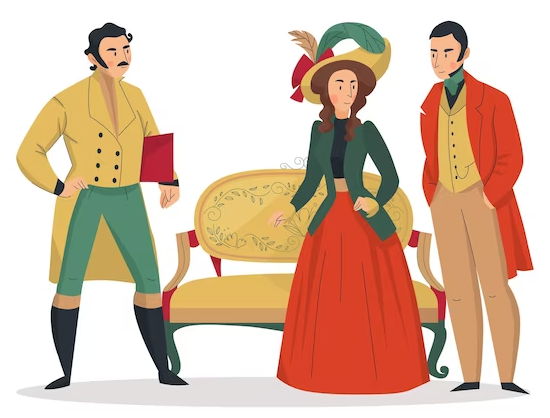Pride and Prejudice by Jane Austen: Summary, Characters and Themes
“Pride and Prejudice” by Jane Austen is a classic novel that explores themes of love, class, and societal expectations in 19th-century England. The story follows Elizabeth Bennet, the second eldest of the Bennet sisters, as she navigates the complex world of social hierarchies and romantic entanglements.
The plot unfolds as the wealthy and eligible bachelor Mr. Charles Bingley moves to the neighborhood, attracting the attention of Mrs. Bennet, who is eager to marry off one of her daughters to him. Bingley becomes interested in Jane, the eldest Bennet sister, while his close friend, the brooding and enigmatic Mr. Fitzwilliam Darcy, captures the curiosity of Elizabeth. The novel explores the evolving relationships among the characters, revealing the complexities of love and societal expectations.
The characters in “Pride and Prejudice” are richly drawn and representative of various social classes. Elizabeth Bennet, known for her wit and intelligence, challenges the norms of her time by rejecting societal pressures to marry for financial security. Mr. Darcy, initially perceived as proud and aloof, undergoes significant character development as he learns to overcome his prejudices.

Themes of love and marriage are central to the novel. Austen satirizes the societal emphasis on wealth and social status in matrimonial unions, advocating for love and compatibility instead. The novel also delves into the consequences of first impressions and the importance of self-awareness in overcoming personal flaws.
In conclusion, “Pride and Prejudice” remains a timeless exploration of social dynamics, love, and personal growth. Austen’s keen observations and witty narrative style contribute to the enduring appeal of this classic work, making it a must-read for those interested in the intricacies of relationships and societal expectations in the 19th century.
Pride and Prejudice of the Setting: The cultural and historical setting of the story
“Pride and Prejudice” by Jane Austen is set in early 19th-century England, during the Regency era. The cultural and historical setting plays a crucial role in shaping the characters’ behaviors, relationships, and societal expectations depicted in the novel.
The story unfolds against the backdrop of a society where social class and financial status were paramount. The characters are constrained by the rigid social hierarchy of the time, and marriage is often viewed as a means of securing financial stability and social standing. The novel provides a keen insight into the manners, customs, and social norms of the landed gentry and aristocracy in rural England.
The concept of “propriety” is central to the cultural setting, governing how individuals were expected to behave in terms of manners, speech, and conduct. The characters must navigate a world where reputation and social standing are closely tied to one’s behavior and the behavior of one’s family members.
The importance of inheritance and property is another key element of the cultural setting. The entailment of the Bennet family estate to male heirs only adds a layer of urgency to the marital endeavors of the Bennet daughters, particularly concerning the eldest, Jane, who stands to lose her home and security due to the lack of a male heir.
Austen’s exploration of the cultural setting also involves a critique of the prevalent gender roles and expectations. Women were generally expected to marry well and conform to societal norms, and the novel highlights the limited options available to women in terms of education and career.
Need help WRITING RESUMES?
Just submit your requirements and choose a resume writer. That’s all we need to write a winning resume for you.
Pride and Prejudice Book Characters
“Pride and Prejudice” by Jane Austen features a diverse cast of characters, each contributing to the novel’s exploration of love, class, and societal expectations. Here are some of the key characters:
Elizabeth Bennet: The novel’s protagonist and second eldest Bennet sister. Elizabeth is known for her intelligence, wit, and strong sense of individuality. She challenges societal norms and expectations, particularly regarding marriage.
Mr. Fitzwilliam Darcy: A wealthy and initially perceived as proud and aloof gentleman. Darcy becomes the romantic interest of Elizabeth. Despite his initial reservations, he undergoes significant character development throughout the story.
Jane Bennet: The eldest Bennet sister, characterized by her beauty and gentle nature. Jane is initially courted by Mr. Bingley, and her storyline explores the challenges of love and miscommunication.
Mr. Charles Bingley: A wealthy and amiable gentleman who becomes enamored with Jane Bennet. Bingley’s character contrasts with Darcy’s and adds to the novel’s exploration of social class and personality differences.
Mr. Bennet: The patriarch of the Bennet family. Mr. Bennet is characterized by his sarcastic wit and somewhat detached attitude towards his wife and younger daughters.
Mrs. Bennet: The matriarch of the Bennet family. Mrs. Bennet is preoccupied with marrying off her daughters to wealthy suitors and is often portrayed as frivolous and excitable.
Mr. Collins: The clergyman and heir to the Bennet estate. Mr. Collins is characterized by his obsequiousness and comical self-importance. He proposes to Elizabeth early in the story, leading to a pivotal plot development.
Lady Catherine de Bourgh: A wealthy and domineering aristocrat. Lady Catherine is Mr. Darcy’s aunt and plays a role in the unfolding of the novel’s plot.
Mr. Wickham: A charming officer with a complicated history with Mr. Darcy. Wickham’s character introduces elements of scandal and deceit into the story.
Charlotte Lucas: Elizabeth’s close friend and pragmatic foil. Charlotte makes a practical but unconventional choice in marriage, highlighting the societal pressures faced by women.
These characters, along with others, contribute to the richness and complexity of “Pride and Prejudice,” creating a narrative that skillfully explores the nuances of relationships, societal expectations, and personal growth.
A full summary of how a love story in pride and prejudice unfolds

Elizabeth and Darcy spend a lot of time together at balls, and Elizabeth begins to realize that Darcy isn’t the cold, arrogant person she thought he was. He also realized that he had fallen in love with her. However, the Bingley brothers decide to return to London without telling Jane or Elizabeth. When Elizabeth heard about this she was furious with Darcy as she felt that she was one of the reasons they left. Later, Elizabeth takes a walk around the area and meets her friend Charlotte Lucas, who has accepted an offer to marry Mr. Collins – a man she doesn’t like. Elizabeth was very surprised by this and tried to convince Charlotte not to accept it. Finally, Charlotte still decided to accept it for economic reasons. Several months later, Darcy returns to the county and apologizes to Elizabeth for her previous bad behavior. He also expressed his love for her and asked her to marry him. After some deliberation, Elizabeth finally agreed to marry Darcy even though her father didn’t agree with it. They ended up getting married in the local church in the presence of all their friends and relatives.
Sister Bingley realized that Darcy was the right person for Elizabeth. They both share the same interests, and they also share the same views on life. Sister Bingley also realized that Darcy was a kind person and would never hurt Elizabeth. Ultimately, the Bingley sisters accepted the relationship between the two and supported them. The next day, Darcy writes a long letter to Elizabeth regretting and admitting that she had done wrong in getting in the way of Jane and Mr. Bingley’s relationship. He also admits that the stories of Mr. Wickham about himself is a lie.
In the letter, Darcy also expressed his love for Elizabeth and apologized for his previous bad behavior. Elizabeth was very surprised by the contents of the letter, but she did not immediately tell Darcy about her change in attitude. He decided to see how Darcy behaved at the Pemberley Estate when they saw each other again. When Lizzy arrived at Pemberley, people there talked about how kind Darcy was and how well he took care of his employees. This made Elizabeth start to see Darcy in a different light. One day, when Lizzy is visiting Pemberley, she hears bad news about her younger sister Lydia who has run away with officers from Wickham. When Lizzy started to shed tears, Darcy came over to give her some sort of comfort and listened to Lizzy’s story about the matter. After that, Elizabeth finally found out that Darcy had paid off Wickham’s debt to marry Lydia and save her family’s good name. After this, Elizabeth finally realized that she was wrong about Darcy and started to see her in a different light. They were finally able to continue their relationship and finally married each other after a few months. Everyone involved in this story is united and enjoying a happy life.
Pride and prejudice theme
“Pride and Prejudice” by Jane Austen explores several themes that remain central to its enduring appeal. Here are some key themes:
Love and Marriage: The novel examines the various facets of love and marriage in the society of early 19th-century England. It critiques the prevailing view that marriage should be based on social status and financial security rather than genuine affection.
Social Class: Austen vividly portrays the rigid social hierarchy of the time and the impact it has on individuals’ lives. The characters navigate societal expectations and prejudices associated with their social standing.
Pride and Prejudice: The title itself reflects the central theme of the novel. Both Elizabeth Bennet and Mr. Darcy must overcome their own pride and prejudices to recognize and appreciate each other’s true worth. The narrative suggests that first impressions can be misleading and that personal growth involves overcoming one’s preconceived notions.
Individuality and Independence: Elizabeth Bennet is a character known for her independent spirit and refusal to conform blindly to societal expectations. The novel explores the tension between individuality and societal norms, particularly regarding women’s roles and choices.
Satire and Irony: Austen uses satire and irony to critique the manners and customs of her society. The novel satirizes the obsession with marriage, the superficiality of societal expectations, and the consequences of adhering strictly to social norms.
Appearance vs. Reality: The novel highlights the disparity between how things appear and the reality beneath the surface. Characters like Mr. Wickham present a charming exterior that conceals less admirable qualities, emphasizing the importance of looking beyond appearances.
Women’s Roles: The novel delves into the limited options available to women in terms of education, employment, and social mobility. The female characters, particularly Elizabeth, challenge traditional gender roles and expectations.
Money and Inheritance: The economic aspects of marriage are prominent in the narrative. The entailment of the Bennet family estate adds a layer of urgency to the need for the Bennet daughters to marry well, illustrating the impact of inheritance laws on family dynamics.
Self-Reflection and Growth: Characters in the novel undergo personal development and self-reflection. Elizabeth and Darcy, in particular, learn from their mistakes and prejudices, demonstrating the importance of self-awareness and personal growth.
Social Commentary: “Pride and Prejudice” serves as a commentary on the manners and morals of the author’s time. Austen critiques the societal emphasis on superficial qualities and the consequences of blindly adhering to societal expectations.
These themes collectively contribute to the novel’s timeless appeal, offering readers a rich and insightful exploration of human nature, societal conventions, and the complexities of relationships.
